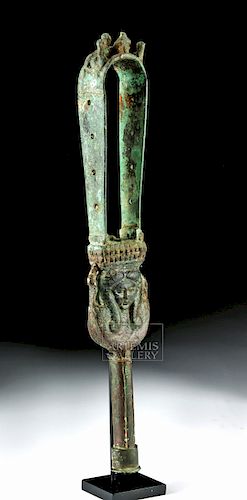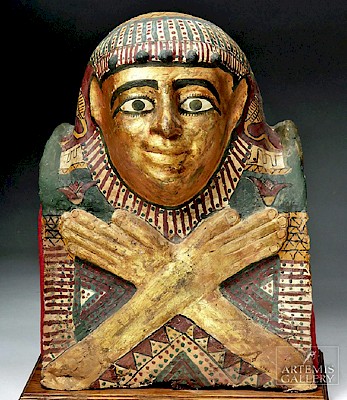Romano-Egyptian Bonze Sistrum with Cats and Hathor
Lot 11
About Seller
Artemis Fine Arts
686 S Taylor Ave, Ste 106
Louisville, CO 80027
United States
Selling antiquities, ancient and ethnographic art online since 1993, Artemis Gallery specializes in Classical Antiquities (Egyptian, Greek, Roman, Near Eastern), Asian, Pre-Columbian, African / Tribal / Oceanographic art. Our extensive inventory includes pottery, stone, metal, wood, glass and textil...Read more
Categories
Estimate:
$10,000 - $14,000
Absentee vs Live bid
Two ways to bid:
- Leave a max absentee bid and the platform will bid on your behalf up to your maximum bid during the live auction.
- Bid live during the auction and your bids will be submitted real-time to the auctioneer.
Bid Increments
| Price | Bid Increment |
|---|---|
| $0 | $25 |
| $300 | $50 |
| $1,000 | $100 |
| $2,000 | $250 |
| $5,000 | $500 |
| $10,000 | $1,000 |
| $20,000 | $2,500 |
| $50,000 | $5,000 |
| $100,000 | $10,000 |
| $200,000 | $20,000 |
About Auction
By Artemis Fine Arts
Jun 20, 2018
Set Reminder
2018-06-20 10:00:00
2018-06-20 10:00:00
America/New_York
Bidsquare
Bidsquare : DAY 1 | Antiquities, Asian, Russian, Fine Art
https://www.bidsquare.com/auctions/artemis-gallery/day-1-antiquities-asian-russian-fine-art-3276
Day 1 of an important 2-day auction featuring exceptional art from around the world Artemis Fine Arts info@artemisgallery.com
Day 1 of an important 2-day auction featuring exceptional art from around the world Artemis Fine Arts info@artemisgallery.com
- Lot Description
Egypt, Romano-Egyptian period, ca. 30 BCE to 2nd century CE. A beautiful example of a bronze sistrum with rich decoration. It consists of a handle with a small knob that rises to meet a double Hathor head complete with a relief face and elaborate wig. Above her is a tall arch with several cats perched atop its curved top. Similar examples (see below) show a cat seated above the Hathor heads as well. Each side of the arch has four evenly-spaced holes in it, used for placing fixed rods. Size: 2.5" W x 14.95" H (6.4 cm x 38 cm); 15.75" H (40 cm) on included custom stand.
The sistrum, meaning "that which is being shaken" in Greek, is a percussive musical instrument, known mostly from ancient Egypt and Mesopotamia. When shaken, the metal rods within the arch produce a sound that can range from a soft clank to a loud jangling. Some people even hear a sound complementary to that of a hissing snake when the sistrum is played. The sistrum was particularly important for the Egyptian worship of the goddesses Hathor and Bastet. Bastet is often depicted holding one of the instruments, as in this statue at the Metropolitan Museum of Art: https://www.metmuseum.org/art/collection/search/545970. You can imagine priestesses playing these, singing, while processing into a temple built to worship these powerful goddesses.
See a similar example with the rods intact at the British Museum: http://www.britishmuseum.org/research/collection_online/collection_object_details.aspx?objectId=170181&partId=1
Provenance: private Davis collection, Houston, Texas, USA
All items legal to buy/sell under U.S. Statute covering cultural patrimony Code 2600, CHAPTER 14, and are guaranteed to be as described or your money back.
A Certificate of Authenticity will accompany all winning bids.
We ship worldwide and handle all shipping in-house for your convenience.
#133027Top of arch is repaired in two places. Also repaired on handle One side of the Hathor head is missing a small piece that would have given it an opening (as the other side does). The fixed rods that would have spanned the arch are lost. The handle has been repaired just below the Hathor heads.Condition
- Shipping Info
-
All shipping is handled in-house for your convenience. Your invoice from Artemis Gallery will include shipping calculation instructions. If in doubt, please inquire BEFORE bidding for estimated shipping costs for individual items.
-
- Buyer's Premium



 EUR
EUR CAD
CAD AUD
AUD GBP
GBP MXN
MXN HKD
HKD CNY
CNY MYR
MYR SEK
SEK SGD
SGD CHF
CHF THB
THB
















